CO-CREATION: ‘Mysteria’, Understanding Steiner – By Michael Tsarion
SM
Source – michaeltsarion.com

The philosopher and mystic, Rudolf Steiner, asked an important question: What do we know about thinking?
Whatever it is, it happens within us, so presumably we know quite a lot about it. We should know everything about it, and it’s rather strange that we don’t. In fact, most people rarely think about thought or realize that saying the word “know” implies the process of thought.Thought occurs continually, even when we’re not aware of it, which is most of the time. Observing objects and entities around us happens constantly without anyone thinking about the act of observation. We don’t usually think about what we see during momens of perception. We are too preoccupied seeing and observing what turns up in front of us to simultaneously be aware of thought processes running behind the experience. Thought exists all right, but is rarely the focus of attention. Steiner noticed something strange about this oddity. He questioned why, in relation to perceived objects, thought is almost extinguished, returning with customary force when a concept is the center of attention.
Is this because concepts are now internalized and part of the mind? As mental pictures, they are prioritized over mere percepts. Again, it’s by way of thought that such a distinction is made. It is as if the concept is prioritized and favored because it belongs to the mind in a way that a percept does not. However, even when concepts, or mental pictures of reality, take form out of perceptions or percepts, we’re not wholly attentive to what goes on. It’s a rather sophisticated process rarely if ever brought to full attention. Clearly, a lot of our thinking happens behind a curtain of sorts. What is it that decides what gets seen and what remains in darkness?
The temporary suspension of thought at these times may be seen as our act of “making space” for the Other, that is the perceived object to, as it were, enter our being. Do we make way for the world? Do we mentally stand aside for the world’s content to explore our being? Is this what is meant by the terms “open” and “closed” minds?
Of course we can choose to bring attention to our subtle thought-processes when and if we wish to. It’s the remarkable thing about thought that Steiner wished to emphasize. Thought can reflect upon itself. It can subdivide at will and self-surveil. How so? Is this because the brain is divided into separate hemispheres? Or is it due to some other more rarefied capacity of “mind?”
It’s quite a complex capacity to observe and then observe ourselves in the act of observation, to think and then turn thought toward itself.
Steiner wanted to draw attention to thought’s primacy in every sense. Even if one insists on reducing thought to the brain, rather than the mind, one must still grant that the capacity to think is remarkable in the extreme. After all, to know what thinking is and does requires thinking.
What’s going on?
How and why did such an odd dyadic capacity develop?
The Materialists responds by citing the world of material phenomena. No, replies Steiner. The paradigm of Materialists is one of “naive realism” which explains away the truth about the connections between psyche and matter.
Directing attention to the physical world of sense-data misleads us as to the workings of consciousness. This is because the external world asks no questions of us. It cares not if we know about it or not. It’s only mind which indulges in asking questions about reality, not reality itself. Thinking asks the questions it answers. It’s tragic that so few people note how extraordinary this is. As far as Steiner was concerned, Materialism and science in general do their best to lead attention away from this puzzle.
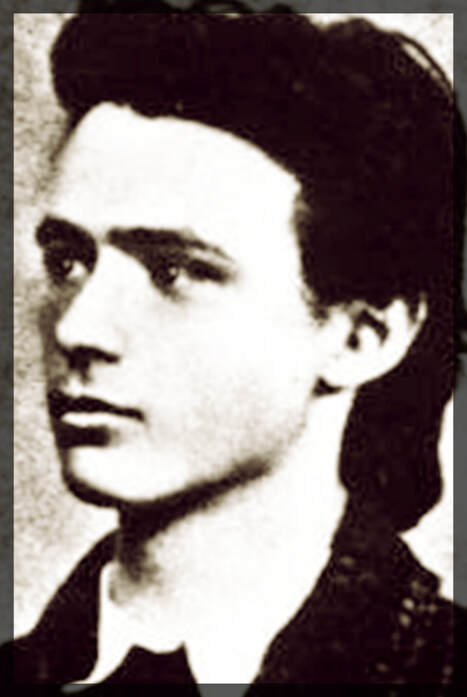
The basic fact is also, upon reflection, startling. Thought is always an internal process, an intimate process that should pose no mystery to us. We are thinkers. Why then do we know so little about thought’s origin and ultimate purpose? Why do we allow ourselves to go along from day-to-day, thought-to-thought without staggering in amazement at what’s happening?
After all, the very thing we call an “I” or “Self,” is put together by thought. Thinking is more primary than the thinker, and that’s certainly an edifying fact. We are beneficiaries of what already exists in potentia within us. We find ourselves thinking, and it is only our arrogance that believes thought comes online when we think we’re thinking.
Let us remember that observation is a passive act, not really an act at all. Thinking, on the other hand, is most definitely active. You’d think it would be the central focus of attention. But science sees it differently and has mistaught us to do the same. When, asks Steiner, is thought itself ever the center of anyone’s attentio?.When Descartes, the father of modern philosophy, said I think, therefore I am, he rested his proof of identity on thinking and doubt. But he omitted to consider how little the statement really tells us. Okay, I know from it that I am a thinker. I know that anything and everything I wish to know about being alive is offered me by thought. Whatever I come to know about myself as an existing person, is established by thought.
Thought will also be there to doubt what thought proffers forth about my existence and experience. Therefore, I wonder if it is me or thought itself that does the experiencing. In such a case, the “me” I take myself to be, might not exist in the way I suppose. If thought delivers knowledge to me about my existence and experience, then it is thought, I trust, that knows more than I do about it. But that doesn’t make sense, because I’ve already established, by way of thought, that I am the thinker. In the end, I’m left to question whether it matters that to exist requires thought, or that to think requires existence. What has it to do with my particular life what the answer is? Shall I trust my own thought on the matter, or someone else’s?
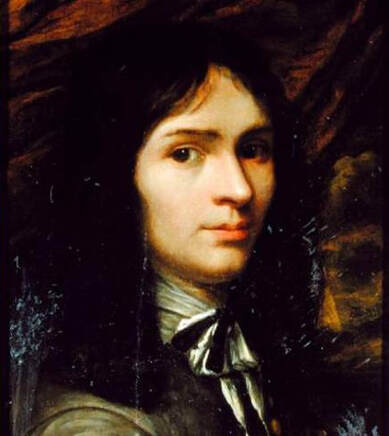
In any case, whatever I come to know about anything, I know via thought. I also know, beyond any possible doubt, that thinking is a process occuring within my being.
It is, therefore, as a thinker that I know I exist. Through thinking I recognize that I have an inner life, separate from the objective phenomena of the world. Thought allows me to operate in both internal and external worlds.
By directing us to the external domain, science seeks to empty us of ourselves. It seeks to reduce the inner life to the outer, and Steiner was having none of it.
And yet, there are so many things about the inner life of man that are unclear and puzzling. There’s so many things thought does not explain about its activity. Thinking is certainly not omnipotent. It has limits. Given that this is the case, who or what sets thought’s limits? Furthermore, if a limit or boundary exists, does it not, as Hegel said, confirm that regions exist beyond them? What does thought know about realms beyond its dominion? What can it know?
Perhaps it’s a case of temporary limits. Perhaps what lies unseen and unknown will one day be seen and known. Why limit the mind’s capacity at all? It’s not a very productive approach. Should not the focus always be on the triumphs of thought? Shall we not prioritize what is known and knowable?
Before nodding to affirm, we must answer the question of why mind asks questions about itself? It’s not all-knowing even about its own identity. If it were otherwise we’d never be compelled to ask “who am I?” We’d know as soon as we become conscious of ourselves as individualized beings. So what are we to make of a mind which endlessly inquires into the meaning of its own existence?
Limits exist to constrain the mind because we are not to flit from A to Z in our experiences. Rather, we are to remain for a time with things encountered. We are not flooded by all reality at once, because we are to “greet” each thing as it appears and empathically linger with it. We are to enter into meaningful relationship with the cosmos as a whole, yes, but also with individual things sent us by the cosmos. Steiner is emphatic about this sense of being in the world.
Despite its obvious limits, Steiner challenged Materialists to consider the facts about the primacy of thought. After all, for a Materialist to deny absolutes, he must be able to think. All his refutations of higher life come to him by way of thought, which, for Steiner, is higher life.
Therefore, the Materialist’s denial of absolute realities is wrongheaded from the start. His opinions, ideas and conclusions on each and every subject are all matters of thought, and nothing but. Even if emotions play a part in his worldview, surely he gives them mental attention. Surely he meditates upon them to distil meaning from them. His quest to discover in “matter” the source of mental processes demands thought be employed as the superlative tool for the job. How can it be otherwise?
Of course to know what is what in the material world, clearly implies that thought must have a certain detachment from what it observes. It seeks to know about a thing, which means that thought has a separate identity. It turns attention to an object, not as that object or something of the same kind. It becomes something of the same kind later, after it observes and thinks. Thinking is the means by which the world is internalized and made mental.
Strange that this phenomenal process isn’t the focus of science.
It is this sovereignty of thought – of the mind – that Materialists cannot explain or fathom. They believe in and exalt “what they can see,” without realizing that seeing is itself a matter of thought which cannot be seen. Thinking is non-material. It is spiritual.
Thought cannot and does not turn its attention to the “spiritual” because it is itself Spirit. It is Spirit in action.
The body of the Materialist is material, no doubt. It is made of clearly discernable substance that can be measured, classified and compared. But all three procedures are carried out by that which is non-material, namely thinking. Thinking itself cannot be seen, measured or explained, except by more thinking. Thought is, therefore, self-generating, self-sustaining and self-referencing. It is the subject and also the object of its own awareness. It knows what it is and what it is not.
Although the Materialist’s body can be seen and measured, the mind within him cannot be so delineated. How irritating to be in such a predicament.
Apparently then, thinking is its own origin. Thought can rightly state that it exists because it exists. Descartes’ statement is, therefore, really the affirmation not of a stereotypical thinking “me,” but of thinking itself. It is thought which says I think, therefore I am.
It makes perfect sense, since the only way we know if anything – including ourselves – exists or not, is by way of thought.
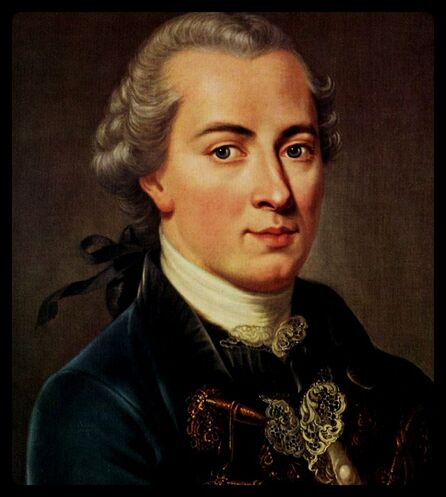
The ardent Materialist, then, does well to grant that anything he strives to know about the origin of mind requires the input of mind. Humans are at all times servants of thought. As such, they must not demand of thought – of mind – that which it does not wish to reveal.
And since thought is, as said, internal to man, that which mind holds back from the cashe of knowledge, must be about man himself. We seek knowledge, yes, but beyond that we seek knowledge of Self. We chafe against the fact that total insight has not yet been attained. We do so without contemplating what the consequences would be if we were furnished with complete Self-knowledge, and did know all there was to know about ourselves.
Might that level of self-transparency not be the end of thinking as we know it? Would it not be the death of meaningful experience? Is not a measure of ignorance necessary for progress to occur?
Is the thinking that endows me with Self-knowledge – with all I know about myself – not to be trusted to know what is best for me to know at any given time? Are there to be no natural rites of passage? Has Hegel not convincingly explained why gradual maturation is necessary and essential? In the end, the supreme job of thinking – of the brain and/or mind – is being accomplished. The task of thinking is to understand reality, not necessarily to discover how it physically comes about. The universe chronologically predates human thought, so there are bound to be things we cannot know about it. Quantum theorists confirm this fact.
As Kant shows, although human thought came to be after reality took shape, whatever reality we do know and experience depends upon thought to be what it is. There can be, therefore, no reality for us without thought, which is the sole gateway though which we must pass if we are to comprehend deeper realities. Thought is our psychopomp or guide out of ignorance. As such it demands a respect no Materialist grants it.
Of course, Steiner’s focus was not specifically the external world of phenomena. It was the content of our own being, our own heads.
The human problem is simply this, that before we can understand the nature of nature, or of reality, we must first understand the lineaments of thinking. What it brings before us and leads us toward is not as important as thought itself. For the sage, thought is the supreme mystery, facilitating our encounter with all other mysteries; everywhere and everywhen.
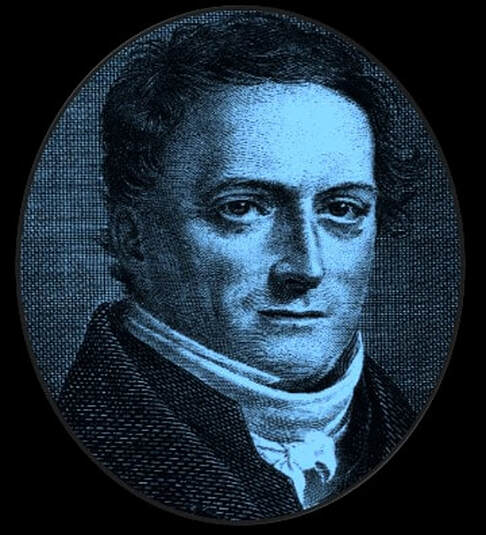
Steiner’s refutation of Scientism and Materialism is straightforward. He wrote that by exalting observable data, as the basis of scientific certainty, one automatically places secondary emphasis on thinking.
Science errs by prioritizing observation rather than thought, when it is thought that gives us true access to reality. Since thought is activated by what is observed, observation must serve thought. In other words, the material serves the spiritual, not the other way around.
The passive observer, says Steiner, is not aware of his participation in the process. His observation is not necessarily relationship. In fact, as said above, in almost every act of raw observation, one is not conscious of the activity of thought. Although thought-processes are not suspended, they are removed from attention. Therefore, any science based purely on observation and sense-data cannot at the same time claim to be intelligent in any robust sense.
Thought, says Steiner, is not the priority of science. We’ve fallen for a total fraud. What, he asks, is it to know about a phenomenon without knowing about the means by which knowing is possible? Leaving the thinker out of an act of thinking reduces the whole process to a matter of mechanics. We’re talking the computerization and dehumanization of man. At this robotic level the “thinker” has little sense of his own being and existence. A lizard observes, a man thinks. The latter can direct his observation by way of thought, whereas the former cannot. The latter knows there’s an internal world of thought, the former does not.
What we’re saying here is not fully understood until a key fact is stressed, namely, that for humans every encounter with external phenomena entails Self-knowledge. Unlike other life-forms, humans are Self-conscious. There is, for man, always a measure of Self-understanding involved in every sensual experience. Nothing is completely “objective.” That is the unfortunate delusion of scientific Materialism.
Observation directs us to the external object’s apparent existence and activity. Thinking directs us to our own internal activity. Thinking, not mere observation, transcends the subject-object boundary. Observation brings the world to my attention, whereas thinking gives me the meaning of the world, the meaning of reality.
Steiner here shows that every aspect of our identity – everything we know about ourselves as humans – comes to bear in relation to the world we occupy and observe. There can be no question, therefore, of hard Cartesian dualism. Only by setting the human subject off against the non-human object, does the former attain a sense of life, purpose, will and identity.
We are speaking not of hard dualism, but of Dialectical Monism. What we know as observation, says Steiner, is merely the first stage of an ongoing encounter between two modes of a single Self – the material and non-material polarities of a single consciousness.
To isolate observation as the only bone fide criteria for understanding reality has no philosophical value. The whole enterprise is wrongheaded. This is because observation is the event enabling the thinker to realize himself not only as thinker, but ineffible mystery.
That which we know as “world” provides us with the mirror by which we encounter the complex mystery we are. As Kierkegaard remarked, it’s not a mystery to be understood. Rather it’s a mystery to be experienced.

It is not that I merely observe what appears before me. It is more that, as a thinker, I draw that which is observed to my sight. The percept is a welcome friend, stimulating the thought by which I, as a Self, am reciprocally posited. As Fichte explained, by calling forth or entering the world of objects, I locate and fix my point of perspective, the zone in which Self-realization occurs. Shifting perspective, by an act of free will, I come again upon myself as observer and thinker.
In other words, by way of my encounter with world, I locate myself as a Self in time and space. Observation is not the active principle here, says Steiner, it is thought. At all times the thinker is the prime datum. Mere observation takes me to the object, whereas thought brings me to myself.
For the Materialist none of this holds. Knowing the world is, for him, not the absolute means of defining Selfhood. As Steiner points out, the Materialist is bound to separate observation from thought. But in doing so he enters a labyrinth of contradiction and self-deception, making himself an aenemic mechanical observer, rather than a living being. He irrationally maintains the hard Cartesian fissure between Self and world. As mere observer he sets up a divided world to be imperiously surveilled, controlled and deemed lower on the scale of being

We’re nearly there folks…Last stop, Perfection!…
All the while, the Materialist forgets that his mental concepts take form as bridges between mind and matter. They stand as proof of the invisible symbiosis between mental and physical realities.
Steiner saw the concept as the essential means by which psyche and matter communicate. A concept is, so to speak, the ambassador or translator between miscrocosm and macrocosm. The humble concept unites subject and object. It is the evidence of the feedback-loop between matter and mind.
As great sages like Steiner endlessly point out, to know the world means that something of the world must already be inherent within my being, and that something of the psyche must be inherently in the world. What Steiner wants us to understand is that this dynamic is the result of the mind’s activty.
The reductionist scientist cons himself, saying his perspectives are impersonal, detached and objective. However, they are all-too-personal. They are detached only in a predatory sense. The bloodless Materialist view is demonstrably Faustian. As Bacon said, we are to put nature “on the rack.” As Wordsworth perceptively and poetically put it, it’s about “murdering to dissect.” In other words, it’s about pure unadulterated exploitation, by which the criminal plunderer attempts to wash his unclean hands and evade responsibility for his desecrations.
The duplicitous process of self-exoneration continues today. Well-meaning scientists within the system, who speak out about the chicanery and institutionalized fraud, are summarily ridiculed and professionaly assassinated.
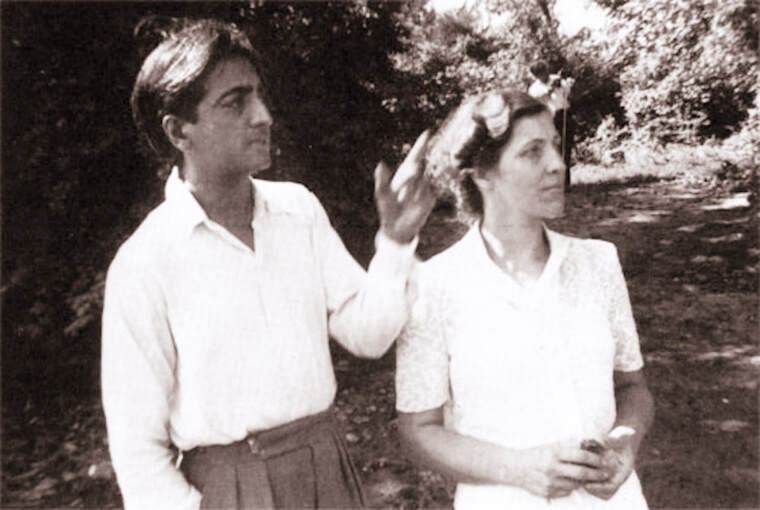
He who murders to dissect cannot afford to see himself as part of what he molests and destroys. At an early age he must be taught to rationalize his insensitivity. He must be instructed to stand apart from his quarry and victim.
As mere observers, the scientist’s standpoint is detached and indifferent. Or so he believes. He is in fact isolated from reality. His so-called observation polarizes him from the real – the very thing he claims to investigate. He positions himself at the worst vantage point for understanding reality. He greets reality with clenched fists and closed mind. He cannot know the world by merely observing it in this passive, predatory manner.
Steiner understood why the whole faustian nightmare came into being. By refusing to know the essence of knowing – of thinking – the reductionist and Behaviorist program is doomed from the start. Despite his careful observations of the material world, the reductionist learns nothing about his internal world – the place from which thought emanates. For all his “thinking” about external reality, he’s ignorant as to the internal domain of thought. For him, there’s observation, yes, but not the “I” who observes.Steiner adroitly explains how and why orthodox science came to err in this way. It’s based on the simple fact that when we observe any object in front of us, we are less aware of our thinking process. To be sure, we are always thinking, but, as said above, we are rarely attentive to the process of thought happening within our being. We prefer to disregard it. Focusing on a percept allows us to forget ourselves as thinking beings. It allows us to temporarily extinguish thought or Spirit.
This is why we have made the world of objects and entities far more important than the inner world of the mind. After many centuries of giving way to this evasive habit, we’ve come to know very little about ourselves as thinking beings. Thinking becomes, for all its extraordinariness, mechanical and prosaic.
Our very busyness and extroversion serve the same purpose of self-forgetting. If we have to think, let it be about the external rather than internal world. We are ready to use thought all right, but not ready to uncover its source or deeper significance. As Heidegger said: the strange thing about our thought-provokiing time is that we’re still not thinking.
To think correctly means noticing that which Steiner addresses. We would begin to notice what happens when we encounter physical objects by way of perception. We’d take note of how we withdraw attention from ourselves and our thought-processes, and would soon begin asking why this occurs.

Apparently we prefer to direct thought to anything other than thought itself. However, doing so inevitably entails a lack of humanness, in the true sense of the term. Thinking less about thought means we are destined to become less human. The subterfuge isn’t overly successful, because deep down we know what we’re doing to ourselves. We know there must be something about ourselves that must remain hidden from attention, something we must be guilty about, that must never see the light of day. Directing our minds toward the world prevents it looking into its workings. As said, the mind is quite capable of observing itself. This capacity is the supreme mystery of consciousness. For Steiner, real knowledge is only attained when the mind attends to its own nature and function. Steiner would agree that humans are quite capable, mentally, of thinking themselves separate entities. It’s not a bad thing to do so. But because of the hegemony of scientism, we’ve taken things too far. Man no longer sees himself as part of the totality of nature, only as apart from it. Nature as a whole is no longer the context for human life. For most people nature is just something “out there,” something threatening, wild and dirty.
Steiner points out to Materialists that although their focus and dictum is external observation, the concepts about external data are formed by the internal workings of a very real mind. Not only does the mind assemble concepts, but something even more elusive and rarefied enables one concept to congress with others of its kind. Do the concepts manage this feat on their own? Surely not. But what then is the capacity by which concepts identify, cohere and “make sense?” Again, says Steiner, the answer is thought.
Why do scientists refuse to intelligently acknowledge the supremacy of thought over observation? Why persist in doubting the existence of mind, when such doubt leads to profound ignorance and bias? Finding ourselves endowed with the capacity to divide, abstract and separate, presupposes we also find within ourselves opposite capacities. We are also able to connect, merge and synthesize. We see the whole, not only the parts. And again we do so because of the primacy and supremacy of thought, which can break down or build up, fragment or unify. What Steiner, and sages of his excellence, explain is that this unifying capacity exists because we are part of a holistic cosmos. Again, right thinking acknowledges the intimate numinous complimentarity of psyche and physis.
Is it not clear to us, asks Steiner, that making thought or the thinking process an object of thought, requires thought? Do we not agree that the very act of thinking about thought – made possible by the mysterious self-reflexive capacity of mind – nucleates duality?
This is the means by which hard Carrtesian dualism is finally obliterated. According to Steiner, a percept waits until thought welcomes it forth, in order to provide us with a true picture of reality. It is as if thought provides the all-important context of a percept or thing observed. The object observed, then, has no real existence until it is observed and “mentalized.” It exists in the full sense once it becomes mind-stuff.
Hence, we must expand Descartes’ statement, since to think is not only the affirmation of my personal existence, but of all that exists. We’re here to see and know the cosmos, and it’s there to be seen and known.
What we call “wholeness” demands the complementarity of subject and object, percept and concept, observer and observed. Descartes got as far as pointing out the breach and difference between the polarities, not the underlying unison between them.
The next step entails seeing that the world and its particulars must pass through consciousness to become “mental” before reality is grasped and experienced as it is. What we call intuition recognizes the deep connections between consciousness and worldy phenomena. The mental and physical reach out to one another, and each finds completion in the other.

Without the organic symbiosis of world and mind, there’d be no language, curiosity, progress or science. Humans would remain on the animalistic level. Therefore, according to Steiner, science has denied its own foundations, which are clearly spiritual, rather than material.
Had nature not been systematically abused and denigrated, we’d never have ended up in the present mess. We speak of “will” as if it’s a purely human trait. We speak of “progress” as if it too is confined to human intellect. But where do these erroneous ideas come from? That we as humans find ourselves able to progress in any way means the whole cosmos wills it. It’s a reality not exclusively of our making. Rather, it’s part of the fabric of the cosmos, as much as gravity, light and any other natural element. As Schelling said, we are free to regress or progress, because our very being is grounded in freedom. Philosophically speaking, although nature is indifferent to our usage of free will, it is not indifferent to free will itself. Indeed, as Schelling emphasized, free will is nature’s greatest and most precious gift to humanity.
Clearly said, the so-called material reality exists only by way of a spiritually-based complementarity denied by Materialists but venerated by true mystics.
The error exists in all who suppose that we enjoy “relationships” only with other human beings. Are we not in relationship with everything else in reality? As Blake asked, are men not akin to the stars? As Berkeley explained, merely seeing a thing entails entering into a relationship with it. Perception is relationship. The eye is a portal of welcome to the whole creation.
What we call thought is, to a mystic, nothing more than the emanation and sign of the numinous dialogue between Self and Nature. It is the reverberating hymn of a profound communion unthought by reductionists. In their stubborn refusal to realize that what they call “matter” and “spirit” or “subject” and “object,” are two forms of response to “calls” for recognition and empathic interrelation, scientists see to it that the essence of man is dehumanized and materialized.

Central to Steiner’s philosophy is the matter of freedom. It is the theme behind all his investigations into the nature of and function of consciousness. According to Steiner, if everyone forms mental concepts (or pictures of reality) to will and act upon them, freedom must be at the heart of all three processes – conception, will and action. This is obvious once we realize that no two persons need act identically when motivated by any concept in their heads.
Even if a concept in a person’s mind is nearly identical from that in another’s mind, it does not mean each person is bound to act uniformly and robotically. That was the false premise of the Behaviorist school. But their mechanistic Pavlovian view was recognized as totally flawed and unsustainable. Animals, that cannot “conceive” are likely to act uniformly over the stimulus of a given percept, although even animal activity, in this regard, is occasionally varied and unpredictable. Even more so with a human being whose concepts elicit all sorts of varied reactions. Therefore, says Steiner, if thinking has an essence, that essence must certainly be freedom.
Would there be such a thing as “individuality” if it were otherwise? It is impossible to think so. Indeed, we can go further and ask whether there’d be a moral sensibility if freedom of will and thought were not the rule? Given that one is free to act differently than any another person, it follows that one is bound to accede to a moral code when doing so. I must account for my actions, which must be rational and meaningful. I must be able to judge between wrong and right action. With this in mind, we discover that thinking is, essentially and characteristically, a moral act. Need we prove the point by considering the consequences of immoral acts?

Ayn Rand’s take on this aspect of consciousness is of great importance. The immoral person, she says, doesn’t really think appropiately, at least not in the way moral persons do. It’s all a matter of one’s “psycho-epistemology” or express respect for themselves as thinking beings.
It is not that one thinks, but that one remains reverently aware that they do so. The apotheosis of thinking, for Rand, occurs once we relish our unique mental abilities. This self-respect, says Rand, is a kind of heroism underlying authentic creativity. Acts and thoughts bereft of fundamental self-respect lead to nothing positive. There’s nothing “progressive” about it, even if million high-brows in white coats say so.
Freedom comes into the picture, since one is always free to have no such care, sensitivity or attentiveness. All too many men “thinks” without ever caring about it. They greedily grab the benefits of thought – of the mind – without so much as a thank you to consciousness. Awards and praise are heaped on the heads of innumerable experts and geniuses; but not one laurel leaf is gathered for Thought itself.
As far as Steiner was concerned, this despicable insensitivity and omission gives rise to Materialist attitudes and paradigms. It gives rise to scientism and reductionism, where there’s plenty of thinking, but little in the way of valuation. There’s no greater handicap for thinking than a lack of reverence toward it. The human without respect for himself as thinker can never, believed Steiner, gain access to the truth about anything. He’s condemned to remain the victim of his delusion about the origin and nature of thought. He has access not to reality itself, only to his perverse ideas about it. Such a being is shrouded in Mysteria, with no access to the truth of himself or the world he so insensitively occupies.
.
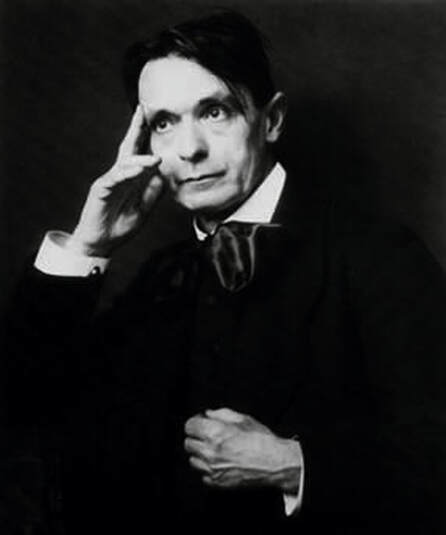
In summary, we see that reality is, in all cases, a matter of thought. This extends to our Self-image or schema, which also depends on thought. And since people are unique individuals, we grant that thought is either what we know as Spirit or is closely akin to it. Again, it is a matter of one’s kind of thinking, or depth of thinking. The fact remains regardless of the words and names we use for explanation.
The central and most striking fact of all is that what we experience as thinking takes place within us, never outside. Thinking is a characteristically human phenomenon. It is ours, in every sense. Strange, then, that we pay it so little attention, and strange that we offer such trite explanations for why we are so disposed. Steiner’s remarks help us uncover our deceptiveness in the matter. Focus on the world – on activity and external preoccupations – entails pushing thought into the background, negating it as much as is possible. For some reason, we do not wish to classify ourselves as thinking beings, except as a pretense. Despite Descartes’ eureka moment, we’re not normally inclined to value our being in a wholesome way.
We think, but do not value it. The reasons are many. Dare we cite our inane trust in what passes for an education system? What about our blind belief that schools, colleges and universities will see us through, and inform us about every mystery? What about our belief that the teacher at the front of the class knows it all? What about our obedience to authority and reluctance to think for ourselves? What about our penchant for collectivism? Could it be our secret unwillingness to follow where thought leads? Could it be because of our craving for falsehood or intellectual arrogance? What about our addiction to ideas about reality, conspicuous hatred of wisdom and contempt for the wise?
Clearly there’s no shortage of escapism and mysteria.
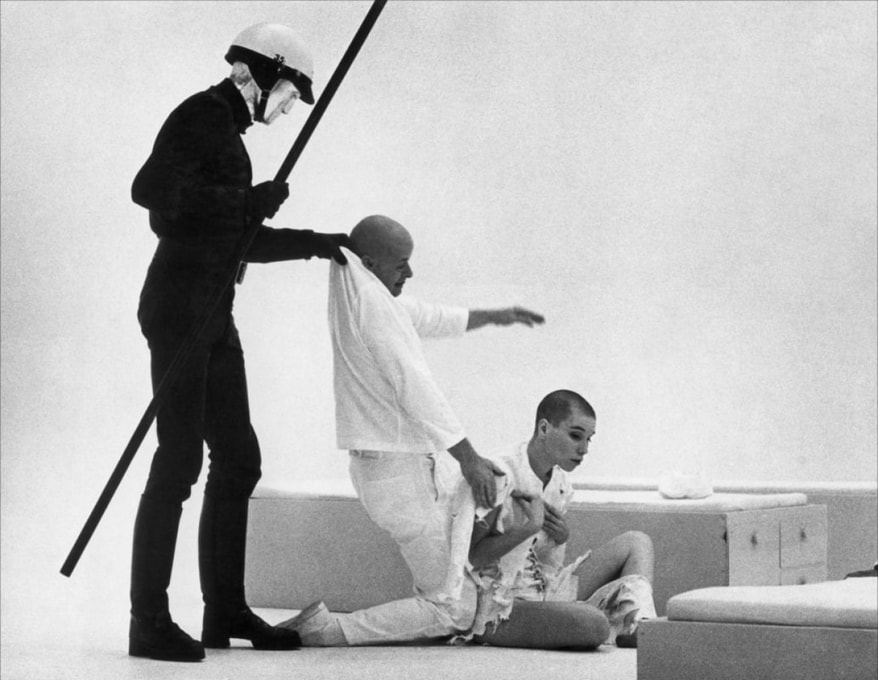
It’s done every day to your child’s mind…just saying… In The Philosophy of Freedom, Steiner reminds us that, when it comes to cognition and knowledge, it is not the world that demands humans form questions about it. Nature doesn’t care whether we’re foolish or wise. Our level of intelligence is of no importance to reality.
The questioning of existence is exclusively a human concern. Questions of every sort, mundane and otherwise, arise in our heads alone. Dead parrots need not apply. I possess both the hardware and software for the task, but nature continues as it is whether I bother thinking or not. Clouds pass whether I attend class or not, whether I flunk out or stay the course.
Nature is a great respecter of my freedom. Our minds form the questions that thinking answers. If we inquire into this conundrum, we do so by way of thought. It’s a strange circular process rarely considered.
Those who give the matter consideration wonder how the miraculous faculty of thought, and the thinking mind, can be relegated and reduced to material stuff or brain-function. Why are physical observation and sense-data given precedence over thought? What topsy-turvy thought-process conjures such misbegotten ideas?
Did the Dark Ages really end? Think about it. . . .
https://www.michaeltsarion.com/understanding-steiner.html
https://rielpolitik.com/2022/04/24/co-creation-mysteria-understanding-steiner-by-michael-tsarion/
Thanks to: https://rielpolitik.com
SM
Source – michaeltsarion.com
- “…As far as Steiner was concerned, this despicable insensitivity and omission gives rise to Materialist attitudes and paradigms. It gives rise to scientism and reductionism, where there’s plenty of thinking, but little in the way of valuation…The human without respect for himself as thinker can never, believed Steiner, gain access to the truth about anything. He’s condemned to remain the victim of his delusion about the origin and nature of thought..Such a being is shrouded in Mysteria, with no access to the truth of himself or the world he so insensitively occupies.“
UNDERSTANDING STEINER – By Michael Tsarion

| The most thought-provoking thing in our thought-provoking time, is that we’re still not thinking – Martin Heidegger |
Whatever it is, it happens within us, so presumably we know quite a lot about it. We should know everything about it, and it’s rather strange that we don’t. In fact, most people rarely think about thought or realize that saying the word “know” implies the process of thought.Thought occurs continually, even when we’re not aware of it, which is most of the time. Observing objects and entities around us happens constantly without anyone thinking about the act of observation. We don’t usually think about what we see during momens of perception. We are too preoccupied seeing and observing what turns up in front of us to simultaneously be aware of thought processes running behind the experience. Thought exists all right, but is rarely the focus of attention. Steiner noticed something strange about this oddity. He questioned why, in relation to perceived objects, thought is almost extinguished, returning with customary force when a concept is the center of attention.
Is this because concepts are now internalized and part of the mind? As mental pictures, they are prioritized over mere percepts. Again, it’s by way of thought that such a distinction is made. It is as if the concept is prioritized and favored because it belongs to the mind in a way that a percept does not. However, even when concepts, or mental pictures of reality, take form out of perceptions or percepts, we’re not wholly attentive to what goes on. It’s a rather sophisticated process rarely if ever brought to full attention. Clearly, a lot of our thinking happens behind a curtain of sorts. What is it that decides what gets seen and what remains in darkness?
The temporary suspension of thought at these times may be seen as our act of “making space” for the Other, that is the perceived object to, as it were, enter our being. Do we make way for the world? Do we mentally stand aside for the world’s content to explore our being? Is this what is meant by the terms “open” and “closed” minds?
Of course we can choose to bring attention to our subtle thought-processes when and if we wish to. It’s the remarkable thing about thought that Steiner wished to emphasize. Thought can reflect upon itself. It can subdivide at will and self-surveil. How so? Is this because the brain is divided into separate hemispheres? Or is it due to some other more rarefied capacity of “mind?”
It’s quite a complex capacity to observe and then observe ourselves in the act of observation, to think and then turn thought toward itself.
Steiner wanted to draw attention to thought’s primacy in every sense. Even if one insists on reducing thought to the brain, rather than the mind, one must still grant that the capacity to think is remarkable in the extreme. After all, to know what thinking is and does requires thinking.
What’s going on?
How and why did such an odd dyadic capacity develop?
The Materialists responds by citing the world of material phenomena. No, replies Steiner. The paradigm of Materialists is one of “naive realism” which explains away the truth about the connections between psyche and matter.
Directing attention to the physical world of sense-data misleads us as to the workings of consciousness. This is because the external world asks no questions of us. It cares not if we know about it or not. It’s only mind which indulges in asking questions about reality, not reality itself. Thinking asks the questions it answers. It’s tragic that so few people note how extraordinary this is. As far as Steiner was concerned, Materialism and science in general do their best to lead attention away from this puzzle.

| Rudolf Steiner (1861-1925) lived long enough to witness the horrors of the First World War. Tragically, he killed himself by refusing to slow down and take rest. Instead, frail as he was, and in diabolical conditions, he tirelessly toured wartime Britain and Europe giving hundreds of lectures on spirituality, consciousness, horticulture, animal-husbandry, free-energy, correct diet, child-education, and a multiplicity of other esoteric subjects. It finally took its toll, and his own health badly declined. He was one of the preeminent figures of the Western Mystical Tradition. Among his foremost proteges was Owen Barfield. |
After all, the very thing we call an “I” or “Self,” is put together by thought. Thinking is more primary than the thinker, and that’s certainly an edifying fact. We are beneficiaries of what already exists in potentia within us. We find ourselves thinking, and it is only our arrogance that believes thought comes online when we think we’re thinking.
Let us remember that observation is a passive act, not really an act at all. Thinking, on the other hand, is most definitely active. You’d think it would be the central focus of attention. But science sees it differently and has mistaught us to do the same. When, asks Steiner, is thought itself ever the center of anyone’s attentio?.When Descartes, the father of modern philosophy, said I think, therefore I am, he rested his proof of identity on thinking and doubt. But he omitted to consider how little the statement really tells us. Okay, I know from it that I am a thinker. I know that anything and everything I wish to know about being alive is offered me by thought. Whatever I come to know about myself as an existing person, is established by thought.
Thought will also be there to doubt what thought proffers forth about my existence and experience. Therefore, I wonder if it is me or thought itself that does the experiencing. In such a case, the “me” I take myself to be, might not exist in the way I suppose. If thought delivers knowledge to me about my existence and experience, then it is thought, I trust, that knows more than I do about it. But that doesn’t make sense, because I’ve already established, by way of thought, that I am the thinker. In the end, I’m left to question whether it matters that to exist requires thought, or that to think requires existence. What has it to do with my particular life what the answer is? Shall I trust my own thought on the matter, or someone else’s?

| Frenchman Rene Descartes (1596-1650) is considered the father of modern philosophy. Later savants, such as Kant, Fichte, Schelling and Hegel, etc, disturbed by his curious ideas about consciousness, attempted to critique him. They, in turn, came under intellectual attack by others. Steiner provides his own insightful commentaries about the western tradition of philosophy. He was certainly opposed to the Cartesian view, and did not accept the case for hard dualism. Although Steiner can be defined as an Idealist, he did not uncritically subscribe to Kantianism, Hegelianism or other schools of traditional Idealism. He was very much his own man. He would have preferred being referred to as an esotericist, mystic, Monist or Monistic-Idealist. He is in the tradition of Jacob Bohme, Meister Eckhart and Emanuel Swedenborg. (Here for more…) |
It is, therefore, as a thinker that I know I exist. Through thinking I recognize that I have an inner life, separate from the objective phenomena of the world. Thought allows me to operate in both internal and external worlds.
By directing us to the external domain, science seeks to empty us of ourselves. It seeks to reduce the inner life to the outer, and Steiner was having none of it.
And yet, there are so many things about the inner life of man that are unclear and puzzling. There’s so many things thought does not explain about its activity. Thinking is certainly not omnipotent. It has limits. Given that this is the case, who or what sets thought’s limits? Furthermore, if a limit or boundary exists, does it not, as Hegel said, confirm that regions exist beyond them? What does thought know about realms beyond its dominion? What can it know?
Perhaps it’s a case of temporary limits. Perhaps what lies unseen and unknown will one day be seen and known. Why limit the mind’s capacity at all? It’s not a very productive approach. Should not the focus always be on the triumphs of thought? Shall we not prioritize what is known and knowable?
Before nodding to affirm, we must answer the question of why mind asks questions about itself? It’s not all-knowing even about its own identity. If it were otherwise we’d never be compelled to ask “who am I?” We’d know as soon as we become conscious of ourselves as individualized beings. So what are we to make of a mind which endlessly inquires into the meaning of its own existence?
Limits exist to constrain the mind because we are not to flit from A to Z in our experiences. Rather, we are to remain for a time with things encountered. We are not flooded by all reality at once, because we are to “greet” each thing as it appears and empathically linger with it. We are to enter into meaningful relationship with the cosmos as a whole, yes, but also with individual things sent us by the cosmos. Steiner is emphatic about this sense of being in the world.
Despite its obvious limits, Steiner challenged Materialists to consider the facts about the primacy of thought. After all, for a Materialist to deny absolutes, he must be able to think. All his refutations of higher life come to him by way of thought, which, for Steiner, is higher life.
Therefore, the Materialist’s denial of absolute realities is wrongheaded from the start. His opinions, ideas and conclusions on each and every subject are all matters of thought, and nothing but. Even if emotions play a part in his worldview, surely he gives them mental attention. Surely he meditates upon them to distil meaning from them. His quest to discover in “matter” the source of mental processes demands thought be employed as the superlative tool for the job. How can it be otherwise?
Of course to know what is what in the material world, clearly implies that thought must have a certain detachment from what it observes. It seeks to know about a thing, which means that thought has a separate identity. It turns attention to an object, not as that object or something of the same kind. It becomes something of the same kind later, after it observes and thinks. Thinking is the means by which the world is internalized and made mental.
Strange that this phenomenal process isn’t the focus of science.
It is this sovereignty of thought – of the mind – that Materialists cannot explain or fathom. They believe in and exalt “what they can see,” without realizing that seeing is itself a matter of thought which cannot be seen. Thinking is non-material. It is spiritual.
Thought cannot and does not turn its attention to the “spiritual” because it is itself Spirit. It is Spirit in action.
The body of the Materialist is material, no doubt. It is made of clearly discernable substance that can be measured, classified and compared. But all three procedures are carried out by that which is non-material, namely thinking. Thinking itself cannot be seen, measured or explained, except by more thinking. Thought is, therefore, self-generating, self-sustaining and self-referencing. It is the subject and also the object of its own awareness. It knows what it is and what it is not.
Although the Materialist’s body can be seen and measured, the mind within him cannot be so delineated. How irritating to be in such a predicament.
Apparently then, thinking is its own origin. Thought can rightly state that it exists because it exists. Descartes’ statement is, therefore, really the affirmation not of a stereotypical thinking “me,” but of thinking itself. It is thought which says I think, therefore I am.
It makes perfect sense, since the only way we know if anything – including ourselves – exists or not, is by way of thought.

| Immanuel Kant (1724-1804) was the first major thinker to scrutinize the limits of thought. He realized from the start the paradox involved in his inquiry, that one must use the mind to observe mind. The peculiar self-reflexive capacity of mind has not been sufficiently explained. Kant deduced that it is due to the existence of a priori or innate mental categories by which the whole of reality is filtered and rearranged. What we know, therefore, isn’t the “real” world at it is in itself, merely our ideas about it. The world appears to us as a representation, and that is all we can ever have access to. These limits of consciousness determine the limits of science. The mind’s organizing categories forever stand in the way of the world we apprehend. This explanation satisfied most people, but Johann Fichte and Georg Hegel were troubled, as were a few other thinkers of the top rank. Kant’s theory can’t actually be falsified. We can’t step beyond the mind to know if he’s right or wrong about the industry of mind. We might be seeing the world as it really is, but there’s no way of objectively confirming it one way or the other. We cannot remove the mind without also removing the world we’re trying to see as it is in itself. Removing the organ of thought leaves us with no external stuff to consider and comprehend. You can’t remove the organs of experience, and still experience. Steiner’s answer to this paradox is to study mind itself, even if we are fated to use mind as the observer of itself. If all we know of a world is given us by mind, then obviously mind is the great mystery, not the world. |
And since thought is, as said, internal to man, that which mind holds back from the cashe of knowledge, must be about man himself. We seek knowledge, yes, but beyond that we seek knowledge of Self. We chafe against the fact that total insight has not yet been attained. We do so without contemplating what the consequences would be if we were furnished with complete Self-knowledge, and did know all there was to know about ourselves.
Might that level of self-transparency not be the end of thinking as we know it? Would it not be the death of meaningful experience? Is not a measure of ignorance necessary for progress to occur?
Is the thinking that endows me with Self-knowledge – with all I know about myself – not to be trusted to know what is best for me to know at any given time? Are there to be no natural rites of passage? Has Hegel not convincingly explained why gradual maturation is necessary and essential? In the end, the supreme job of thinking – of the brain and/or mind – is being accomplished. The task of thinking is to understand reality, not necessarily to discover how it physically comes about. The universe chronologically predates human thought, so there are bound to be things we cannot know about it. Quantum theorists confirm this fact.
As Kant shows, although human thought came to be after reality took shape, whatever reality we do know and experience depends upon thought to be what it is. There can be, therefore, no reality for us without thought, which is the sole gateway though which we must pass if we are to comprehend deeper realities. Thought is our psychopomp or guide out of ignorance. As such it demands a respect no Materialist grants it.
Of course, Steiner’s focus was not specifically the external world of phenomena. It was the content of our own being, our own heads.
The human problem is simply this, that before we can understand the nature of nature, or of reality, we must first understand the lineaments of thinking. What it brings before us and leads us toward is not as important as thought itself. For the sage, thought is the supreme mystery, facilitating our encounter with all other mysteries; everywhere and everywhen.

| German philosopher Johann Fichte (`1762-1814). As a young man he brilliantly pointed out the flaws in Kant’s elaborate theory of mind. A top professor, he was scurrilously accused of atheism and ousted. He lost everything. One of history’s forgotten sages, he placed the emphasis on Selfhood. He was the university tutor of both Hegel and Schelling, who, moved by his extraordinary ideas, took over and developed his work. They did so in fear, not wanting the ever-suspicious imperial authorities to likewise censor and persecute them. Kant himself, in his seventies, was severely warned by the king to cease writing philosophy. Hegel responded to the threat by writing in a complex and obscure style. He has since been relentlessly and unjustifiably ridiculed for his style by lesser minds. Actually, he and other thinkers of his time were in fear of their lives. The fate of their mentor Fichte haunted them until the end of their days. Hegel adapted Fichte’s theory of Dialectics. The infamous terms Thesis, Antithesis and Synthesis were coined by Fichte not Hegel. |
Science errs by prioritizing observation rather than thought, when it is thought that gives us true access to reality. Since thought is activated by what is observed, observation must serve thought. In other words, the material serves the spiritual, not the other way around.
The passive observer, says Steiner, is not aware of his participation in the process. His observation is not necessarily relationship. In fact, as said above, in almost every act of raw observation, one is not conscious of the activity of thought. Although thought-processes are not suspended, they are removed from attention. Therefore, any science based purely on observation and sense-data cannot at the same time claim to be intelligent in any robust sense.
Thought, says Steiner, is not the priority of science. We’ve fallen for a total fraud. What, he asks, is it to know about a phenomenon without knowing about the means by which knowing is possible? Leaving the thinker out of an act of thinking reduces the whole process to a matter of mechanics. We’re talking the computerization and dehumanization of man. At this robotic level the “thinker” has little sense of his own being and existence. A lizard observes, a man thinks. The latter can direct his observation by way of thought, whereas the former cannot. The latter knows there’s an internal world of thought, the former does not.
What we’re saying here is not fully understood until a key fact is stressed, namely, that for humans every encounter with external phenomena entails Self-knowledge. Unlike other life-forms, humans are Self-conscious. There is, for man, always a measure of Self-understanding involved in every sensual experience. Nothing is completely “objective.” That is the unfortunate delusion of scientific Materialism.
Observation directs us to the external object’s apparent existence and activity. Thinking directs us to our own internal activity. Thinking, not mere observation, transcends the subject-object boundary. Observation brings the world to my attention, whereas thinking gives me the meaning of the world, the meaning of reality.
| The subject does not think because it is a subject. Rather, it appears to itself as a subject because it can think – Rudolf Steiner When thinking directs its gaze toward its own activity, it has before itself its object – its very own being, that is – its subject…but it is only because of thinking that we can define ourselves as subjects, and contrast ourselves to objects. Therefore, thinking must never be regarded merely as a subjective activity. Thinking is beyond subject and object. It forms these concepts, just as it does all others – ibid |
We are speaking not of hard dualism, but of Dialectical Monism. What we know as observation, says Steiner, is merely the first stage of an ongoing encounter between two modes of a single Self – the material and non-material polarities of a single consciousness.
To isolate observation as the only bone fide criteria for understanding reality has no philosophical value. The whole enterprise is wrongheaded. This is because observation is the event enabling the thinker to realize himself not only as thinker, but ineffible mystery.
That which we know as “world” provides us with the mirror by which we encounter the complex mystery we are. As Kierkegaard remarked, it’s not a mystery to be understood. Rather it’s a mystery to be experienced.

It is not that I merely observe what appears before me. It is more that, as a thinker, I draw that which is observed to my sight. The percept is a welcome friend, stimulating the thought by which I, as a Self, am reciprocally posited. As Fichte explained, by calling forth or entering the world of objects, I locate and fix my point of perspective, the zone in which Self-realization occurs. Shifting perspective, by an act of free will, I come again upon myself as observer and thinker.
In other words, by way of my encounter with world, I locate myself as a Self in time and space. Observation is not the active principle here, says Steiner, it is thought. At all times the thinker is the prime datum. Mere observation takes me to the object, whereas thought brings me to myself.
For the Materialist none of this holds. Knowing the world is, for him, not the absolute means of defining Selfhood. As Steiner points out, the Materialist is bound to separate observation from thought. But in doing so he enters a labyrinth of contradiction and self-deception, making himself an aenemic mechanical observer, rather than a living being. He irrationally maintains the hard Cartesian fissure between Self and world. As mere observer he sets up a divided world to be imperiously surveilled, controlled and deemed lower on the scale of being

We’re nearly there folks…Last stop, Perfection!…
All the while, the Materialist forgets that his mental concepts take form as bridges between mind and matter. They stand as proof of the invisible symbiosis between mental and physical realities.
Steiner saw the concept as the essential means by which psyche and matter communicate. A concept is, so to speak, the ambassador or translator between miscrocosm and macrocosm. The humble concept unites subject and object. It is the evidence of the feedback-loop between matter and mind.
As great sages like Steiner endlessly point out, to know the world means that something of the world must already be inherent within my being, and that something of the psyche must be inherently in the world. What Steiner wants us to understand is that this dynamic is the result of the mind’s activty.
The reductionist scientist cons himself, saying his perspectives are impersonal, detached and objective. However, they are all-too-personal. They are detached only in a predatory sense. The bloodless Materialist view is demonstrably Faustian. As Bacon said, we are to put nature “on the rack.” As Wordsworth perceptively and poetically put it, it’s about “murdering to dissect.” In other words, it’s about pure unadulterated exploitation, by which the criminal plunderer attempts to wash his unclean hands and evade responsibility for his desecrations.
The duplicitous process of self-exoneration continues today. Well-meaning scientists within the system, who speak out about the chicanery and institutionalized fraud, are summarily ridiculed and professionaly assassinated.

| Indian mystic and educator Jiddu Krishnamurti (1895-1986). Like Steiner, his chief focus was the right education of the young. Both men opened numerous schools throughout the world. Going against the System won them nothing but ridicule. Both men objected to the direct influencing of a child’s mind. Questions about existence are to come from the child naturally. An adult is not to pose as a demigod with all the answers. Children in school were allowed to talk back and criticize the teacher and the teaching. As a vehement anti-collectivist, Krishnamurti’s foremost theme was independence of mind. Get authorities out of the way, and watch what happens. Other notable child-educators were Jean Piaget, Loris Malaguzzi (Reggio System) and Maria Montessori. |
| Receive the children in reverence, educate them in love, and send them forth in freedom – Rudolf Steiner |
As mere observers, the scientist’s standpoint is detached and indifferent. Or so he believes. He is in fact isolated from reality. His so-called observation polarizes him from the real – the very thing he claims to investigate. He positions himself at the worst vantage point for understanding reality. He greets reality with clenched fists and closed mind. He cannot know the world by merely observing it in this passive, predatory manner.
Steiner understood why the whole faustian nightmare came into being. By refusing to know the essence of knowing – of thinking – the reductionist and Behaviorist program is doomed from the start. Despite his careful observations of the material world, the reductionist learns nothing about his internal world – the place from which thought emanates. For all his “thinking” about external reality, he’s ignorant as to the internal domain of thought. For him, there’s observation, yes, but not the “I” who observes.Steiner adroitly explains how and why orthodox science came to err in this way. It’s based on the simple fact that when we observe any object in front of us, we are less aware of our thinking process. To be sure, we are always thinking, but, as said above, we are rarely attentive to the process of thought happening within our being. We prefer to disregard it. Focusing on a percept allows us to forget ourselves as thinking beings. It allows us to temporarily extinguish thought or Spirit.
This is why we have made the world of objects and entities far more important than the inner world of the mind. After many centuries of giving way to this evasive habit, we’ve come to know very little about ourselves as thinking beings. Thinking becomes, for all its extraordinariness, mechanical and prosaic.
Our very busyness and extroversion serve the same purpose of self-forgetting. If we have to think, let it be about the external rather than internal world. We are ready to use thought all right, but not ready to uncover its source or deeper significance. As Heidegger said: the strange thing about our thought-provokiing time is that we’re still not thinking.
To think correctly means noticing that which Steiner addresses. We would begin to notice what happens when we encounter physical objects by way of perception. We’d take note of how we withdraw attention from ourselves and our thought-processes, and would soon begin asking why this occurs.

| The world is the mirror of the Self. By way of every encounter we learn something more about ourselves. We forget this fundamental fact because we’re raised to be selfless collectivists with no real Self to be concerned about. We’re intent only on catering to the needs of the ego or counterfeit self. Abandoning Self inevitably entails losing world. The proof of this sorry predicament is everywhere to be seen. Sages like Steiner killed themselves warning humanity of the dangers to come. Now, tragically, they are barely remembered. |
| To truly know the world, look deeply within your own being; to truly know yourself, take real interest in the world – Rudolf Steiner |
Steiner points out to Materialists that although their focus and dictum is external observation, the concepts about external data are formed by the internal workings of a very real mind. Not only does the mind assemble concepts, but something even more elusive and rarefied enables one concept to congress with others of its kind. Do the concepts manage this feat on their own? Surely not. But what then is the capacity by which concepts identify, cohere and “make sense?” Again, says Steiner, the answer is thought.
Why do scientists refuse to intelligently acknowledge the supremacy of thought over observation? Why persist in doubting the existence of mind, when such doubt leads to profound ignorance and bias? Finding ourselves endowed with the capacity to divide, abstract and separate, presupposes we also find within ourselves opposite capacities. We are also able to connect, merge and synthesize. We see the whole, not only the parts. And again we do so because of the primacy and supremacy of thought, which can break down or build up, fragment or unify. What Steiner, and sages of his excellence, explain is that this unifying capacity exists because we are part of a holistic cosmos. Again, right thinking acknowledges the intimate numinous complimentarity of psyche and physis.
Is it not clear to us, asks Steiner, that making thought or the thinking process an object of thought, requires thought? Do we not agree that the very act of thinking about thought – made possible by the mysterious self-reflexive capacity of mind – nucleates duality?
This is the means by which hard Carrtesian dualism is finally obliterated. According to Steiner, a percept waits until thought welcomes it forth, in order to provide us with a true picture of reality. It is as if thought provides the all-important context of a percept or thing observed. The object observed, then, has no real existence until it is observed and “mentalized.” It exists in the full sense once it becomes mind-stuff.
Hence, we must expand Descartes’ statement, since to think is not only the affirmation of my personal existence, but of all that exists. We’re here to see and know the cosmos, and it’s there to be seen and known.
What we call “wholeness” demands the complementarity of subject and object, percept and concept, observer and observed. Descartes got as far as pointing out the breach and difference between the polarities, not the underlying unison between them.
The next step entails seeing that the world and its particulars must pass through consciousness to become “mental” before reality is grasped and experienced as it is. What we call intuition recognizes the deep connections between consciousness and worldy phenomena. The mental and physical reach out to one another, and each finds completion in the other.

| Schelling pointed out the lunacy of man’s narrow imperious estimation of nature’s role in the advent of consciousness. The laws of necessity, although fixed, were set in motion by Spirit, which is free. Therefore, free will predates the fixed laws of nature. Moreover, consciousness as we know and experience it could never have arisen without the natural world. The evolution of mind occurred in three stages – from unconsciousness to consciousness to self-consciousness. It is, therefore, irrational and niggerdly to deny consciousness to the natural world. Although nature does not share our kind of consciousness, it is the ground of psyche and will. What we have in our heads is put there by nature, and the deeper psyche knows it. We might say that consciousness is the emanation of nature. Consciousness is an “emergent” phenomenon, in the highest sense of the word. Mind and nature are both emergent phenomena of Spirit. (Here for more…) |
Had nature not been systematically abused and denigrated, we’d never have ended up in the present mess. We speak of “will” as if it’s a purely human trait. We speak of “progress” as if it too is confined to human intellect. But where do these erroneous ideas come from? That we as humans find ourselves able to progress in any way means the whole cosmos wills it. It’s a reality not exclusively of our making. Rather, it’s part of the fabric of the cosmos, as much as gravity, light and any other natural element. As Schelling said, we are free to regress or progress, because our very being is grounded in freedom. Philosophically speaking, although nature is indifferent to our usage of free will, it is not indifferent to free will itself. Indeed, as Schelling emphasized, free will is nature’s greatest and most precious gift to humanity.
Clearly said, the so-called material reality exists only by way of a spiritually-based complementarity denied by Materialists but venerated by true mystics.
The error exists in all who suppose that we enjoy “relationships” only with other human beings. Are we not in relationship with everything else in reality? As Blake asked, are men not akin to the stars? As Berkeley explained, merely seeing a thing entails entering into a relationship with it. Perception is relationship. The eye is a portal of welcome to the whole creation.
What we call thought is, to a mystic, nothing more than the emanation and sign of the numinous dialogue between Self and Nature. It is the reverberating hymn of a profound communion unthought by reductionists. In their stubborn refusal to realize that what they call “matter” and “spirit” or “subject” and “object,” are two forms of response to “calls” for recognition and empathic interrelation, scientists see to it that the essence of man is dehumanized and materialized.

| For Schelling and Steiner, nature is the ground of consciousness. The relationship between mind and matter is, therefore, a matter of reciprocity and sharing. Consciousness is, of course, free to deny the communion because, as Schelling emphasized, freedom is the ground of all grounds, the very essence of Spirit. (Here for more…) |
| To be free is to be capable of thinking one’s own thoughts – not the thoughts merely of the body, or of society, but thoughts generated by one’s deepest, most original, most essential and spiritual self, one’s individuality – Rudolf Steiner |
Even if a concept in a person’s mind is nearly identical from that in another’s mind, it does not mean each person is bound to act uniformly and robotically. That was the false premise of the Behaviorist school. But their mechanistic Pavlovian view was recognized as totally flawed and unsustainable. Animals, that cannot “conceive” are likely to act uniformly over the stimulus of a given percept, although even animal activity, in this regard, is occasionally varied and unpredictable. Even more so with a human being whose concepts elicit all sorts of varied reactions. Therefore, says Steiner, if thinking has an essence, that essence must certainly be freedom.
Would there be such a thing as “individuality” if it were otherwise? It is impossible to think so. Indeed, we can go further and ask whether there’d be a moral sensibility if freedom of will and thought were not the rule? Given that one is free to act differently than any another person, it follows that one is bound to accede to a moral code when doing so. I must account for my actions, which must be rational and meaningful. I must be able to judge between wrong and right action. With this in mind, we discover that thinking is, essentially and characteristically, a moral act. Need we prove the point by considering the consequences of immoral acts?

| American philosopher Ayn Rand (1905-1982). Scandalously, despite being a best-selling author, she is not mentioned in official encyclopedias of American philosophy. Although she was an atheist, she championed the freedom of the individual. She too believed that modern man doesn’t really think in any true sense. His ideas are not grounded in wonder or respect for thinking itself. |
It is not that one thinks, but that one remains reverently aware that they do so. The apotheosis of thinking, for Rand, occurs once we relish our unique mental abilities. This self-respect, says Rand, is a kind of heroism underlying authentic creativity. Acts and thoughts bereft of fundamental self-respect lead to nothing positive. There’s nothing “progressive” about it, even if million high-brows in white coats say so.
Freedom comes into the picture, since one is always free to have no such care, sensitivity or attentiveness. All too many men “thinks” without ever caring about it. They greedily grab the benefits of thought – of the mind – without so much as a thank you to consciousness. Awards and praise are heaped on the heads of innumerable experts and geniuses; but not one laurel leaf is gathered for Thought itself.
As far as Steiner was concerned, this despicable insensitivity and omission gives rise to Materialist attitudes and paradigms. It gives rise to scientism and reductionism, where there’s plenty of thinking, but little in the way of valuation. There’s no greater handicap for thinking than a lack of reverence toward it. The human without respect for himself as thinker can never, believed Steiner, gain access to the truth about anything. He’s condemned to remain the victim of his delusion about the origin and nature of thought. He has access not to reality itself, only to his perverse ideas about it. Such a being is shrouded in Mysteria, with no access to the truth of himself or the world he so insensitively occupies.
.

| Year after year the world forgets more and more great men of the past. History is the repository of truth, and the word “History” should be thought of as synonymous with Truth. The foremost solution to the present world’s troubles is for sane people to stick close to great minds of the past. Find out who they are, and never leave their company. In other words, read the masters and save the world from your ignorance. |
| Our highest endeavor must be to develop free human beings who are able of themselves to impart purpose and direction to their lives. The need for imagination, a sense of truth, and a feeling of responsibility – these three forces are the very nerve of education – Rudolf Steiner |
The central and most striking fact of all is that what we experience as thinking takes place within us, never outside. Thinking is a characteristically human phenomenon. It is ours, in every sense. Strange, then, that we pay it so little attention, and strange that we offer such trite explanations for why we are so disposed. Steiner’s remarks help us uncover our deceptiveness in the matter. Focus on the world – on activity and external preoccupations – entails pushing thought into the background, negating it as much as is possible. For some reason, we do not wish to classify ourselves as thinking beings, except as a pretense. Despite Descartes’ eureka moment, we’re not normally inclined to value our being in a wholesome way.
We think, but do not value it. The reasons are many. Dare we cite our inane trust in what passes for an education system? What about our blind belief that schools, colleges and universities will see us through, and inform us about every mystery? What about our belief that the teacher at the front of the class knows it all? What about our obedience to authority and reluctance to think for ourselves? What about our penchant for collectivism? Could it be our secret unwillingness to follow where thought leads? Could it be because of our craving for falsehood or intellectual arrogance? What about our addiction to ideas about reality, conspicuous hatred of wisdom and contempt for the wise?
Clearly there’s no shortage of escapism and mysteria.
| Where is the book in which the teacher can read about what teaching is? The children themselves are this book. We should not learn to teach out of any book other than the one lying open before us and consisting of the children themselves – Rudolf Steiner |

It’s done every day to your child’s mind…just saying… In The Philosophy of Freedom, Steiner reminds us that, when it comes to cognition and knowledge, it is not the world that demands humans form questions about it. Nature doesn’t care whether we’re foolish or wise. Our level of intelligence is of no importance to reality.
The questioning of existence is exclusively a human concern. Questions of every sort, mundane and otherwise, arise in our heads alone. Dead parrots need not apply. I possess both the hardware and software for the task, but nature continues as it is whether I bother thinking or not. Clouds pass whether I attend class or not, whether I flunk out or stay the course.
Nature is a great respecter of my freedom. Our minds form the questions that thinking answers. If we inquire into this conundrum, we do so by way of thought. It’s a strange circular process rarely considered.
Those who give the matter consideration wonder how the miraculous faculty of thought, and the thinking mind, can be relegated and reduced to material stuff or brain-function. Why are physical observation and sense-data given precedence over thought? What topsy-turvy thought-process conjures such misbegotten ideas?
Did the Dark Ages really end? Think about it. . . .
https://www.michaeltsarion.com/understanding-steiner.html
https://rielpolitik.com/2022/04/24/co-creation-mysteria-understanding-steiner-by-michael-tsarion/
Thanks to: https://rielpolitik.com






 Sat Mar 23, 2024 11:33 pm by globalturbo
Sat Mar 23, 2024 11:33 pm by globalturbo

